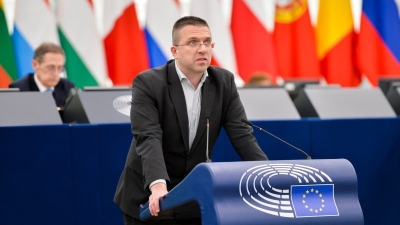Dissatisfaction with EU combustion engine law spreads

If Germany’s last-minute effort to scupper the EU sales ban on new combustion engine vehicles indicated smoke, Italy’s full-throated attack progressed it to a fire. With news that increasing numbers of smaller member states are reneging on their agreement and supporting Germany, it has now become a full blown blaze.
Austria is the latest country to renounce the agreement. The German-speaking nation is backing its neighbours’ call for guarantees over the use of e-fuels as a means to decarbonise combustion engines.
“I, too, will speak out against banning the internal combustion engine [should EU leaders vote on the matter],” said Austrian Chancellor Karl Nehammer.
What kind of vision of the future bans the internal combustion engine “and then focuses only on a sole propulsion mechanism”, Nehammer asked rhetorically – a minor detail perhaps overlooked by his government when voting in favour of the law in November.
This now means that the four-country blocking minority needed to shoot down an EU law has been well exceeded, with Germany, Italy, Poland, Bulgaria, Czechia, and Austria all on the record as wanting concessions. More may yet come, with rumours swirling around the positions of Slovakia, Romania, and perennial thorn-in-the-EU’s-side Hungary.
And so what once seemed unthinkable – that a law that was painstakingly agreed over almost two years will fall at the final hurdle – becomes a real possibility.
If opposition to the CO2 standards for cars and vans has burst into flames, who, then, are the firefighters tasked with dousing the blaze?
This falls to member states that want to see the file enacted and the European Commission, which has an interest in seeing its Green Deal climate laws passed.
The EU executive may deploy a fire blanket in the form of a guarantee that the non-binding recital clause, which requests that the Commission put forward proposals on how e-fuels can be used to decarbonise combustion engines, will be honoured.
This should, in theory, be enough to get Germany (the de facto kingmaker in this situation) to vote in favour of the deal.
But there are barriers. Publicly announcing that the European Commission will explore e-fuels looks very much like the EU executive capitulating to a powerful member state. It gives the ugly impression that the Commission’s cherished “right of initiative” can be held to ransom.
It’s also the case that what is now being demanded may have shifted. Fires, by their nature, spread out of control – whereas once an e-fuels guarantee may be enough, other countries may want a 90% CO2 reduction target for 2035 rather than 100% as it currently stands.
Beyond the Commission’s efforts, the task of spearheading the coalition of member states in favour of the law will likely fall to France.
France was leading the Council of the EU when an agreement was reached among EU countries that included a 2035 ban on the sale of vehicles emitting CO2.
It was an impressive diplomatic feat – one that is now being unpicked by Germany.
The French authorities do not want to see the file fail. Economy Minister Bruno Le Maire told France Info on Monday (13 March) that the country is “ready to go to a showdown” with Germany to save the law.
So, the stage is set for a Franco-German clash. Where this goes from here is anyone’s guess. But for all involved, things are heating up.
Commission to propose a European Declaration on Cycling this summer
Cycling occupies a strange position in EU policy making.
Many politicians, be they from the European Commission or the European Parliament, express their deep and abiding affection for travelling by bike. They talk about how liberating it is, how environmentally friendly and healthy – and that’s usually where it ends.
Cycling infrastructure is generally a competence of local government. Under the EU’s subsidiarity rules, the EU cannot dictate city rules.
However, the climate crisis has seen the EU executive take a more proactive approach to encouraging people to choose two wheels over four in urban areas.
Last Thursday (9 March), EU Green Deal chief Frans Timmermans announced that the European Commission will put forward a “European Declaration on Cycling” this summer, which the Parliament and Council will be invited to sign.
The declaration will help to ensure that EU funding flows towards cycling, and that cycling is better integrated into EU policies.
“Whenever our European initiatives can include a cycling dimension, the Declaration will ensure that it actually does happen,” Timmermans said, speaking at the Cycling Industries Europe Summit.
EU instruments such as the Social Climate Fund and the EU’s 100 climate-neutral cities mission will be utilised to help boost biking infrastructure across the bloc.
Timmermans also said that improved cycling infrastructure could make visiting neighbouring cities by bike possible.
“Thanks to the electric bike, with cycling highways we can connect the cities with the surrounding regions. I’ve seen it happening in Flanders, I see it happening in other countries as well,” he said. “This is not just for inner cities, it’s not just for the urbanites.”
The declaration will additionally cover bicycle parking, with provisions to promote bicycle charging stations within public buildings.
From an industrial standpoint, the declaration will boost e-bicycle manufacturing in Europe by classing the production and selling of bikes “as an important industry to nourish”.
“Bike makers should be full partners in our European industrial mobility plans,” said Timmermans.
Read the European Commission Vice President’s full speech on the declaration here.
Transport planning favours the needs of men to the detriment of women
Most transport plans in Europe are based around meeting the needs of men in full-time employment, increasing the risk of female sexual harassment on public transport, a new study has found.
The needs of women, who often have a greater care-taking role within families, are frequently considered secondary to the needs of men by transport planners, according to a report conducted by Fondazione Giacomo Brodolini for The Left group in the European Parliament.
“Women’s mobility patterns are more complex than those of men. They often require different means of transport because women are primarily responsible for care within families,” states the report.
“Usual techniques and tools developed in transport planning built on the notion of work are generally narrowly understood as paid employment and often mistake care for leisure or personal interests,” it continues.
Infrastructural factors contributing to gender-based violence include a lack of training among staff on how to deal with incidences of sexual harassment, an absence of lighting on paths connecting transport modes, and scarce security staff.
A previous European Parliament study found that around 220,000 women were sexually harassed on public transport in France over a two-year period.
Such incidents create the feeling that public transport is unsafe, leading women to choose private transport modes, such as cars, over mass transit. This contributes to greater congestion, and generally higher emission levels, according to the report.
Other vulnerable groups, such as LGBTQ+ people, are also said to be at a heightened risk of harassment on public transport. This makes such passengers more reluctant to travel at night, for example.
The study recommends that governments consider running public information campaigns against such violence, and that even simple measures, such as ensuring that vehicles arrive at the time stated, can help to prevent harassment.
“Closer monitoring of gender issues in transport policies is urgently needed by all European institutions,” said Silvia Sansonetti, one of the study’s authors, speaking at an event in the European Parliament last Thursday (9 March).
The report concludes that policy makers should include gender experts when planning public transport infrastructure, as greater consideration of gender factors improves how users experience public services.
Read the full report here.

A roundup of the most captivating transport news.
Germany’s FDP accused of ‘blackmail’ in EU combustion engine row
Germany’s last-minute decision to revoke its support for a law that would see the sale of new combustion engines banned from 2035 sets a dangerous precedent for European politics, according to the chair of the European Parliament’s influential environment committee.
REVEALED: Greece, EU lost in Babel of train safety deals
The EU and Greece have been trying to put in place modern safety systems and improve Greek railways’ cross-border interoperability to connect with the rest of Europe for more than twenty years.
Commission, Germany edge closer towards combustion engine ban deal
The European Commission and Germany’s Digital and Transport Ministry are confident an agreement on the EU combustion engine ban can be reached, after a call between Transport Minister Volker Wissing (FDP/Renew Europe) and EU Climate Chief Frans Timmermans on Thursday.
Austria joins Germany in opposing combustion engine ban
Austrian Chancellor Karl Nehammer has promised he will do his utmost to ensure the survival of the combustion engine, joining Germany in opposing the EU’s plan to ban diesel and petrol cars from 2035.
The EU needs a business case for carbon removals
If Europe achieves its 2030 biomethane target it will have unwittingly created the conditions to cheaply mitigate the carbon emissions equivalent to an entire member state, writes James Cogan, policy advisor to Ethanol Europe.



